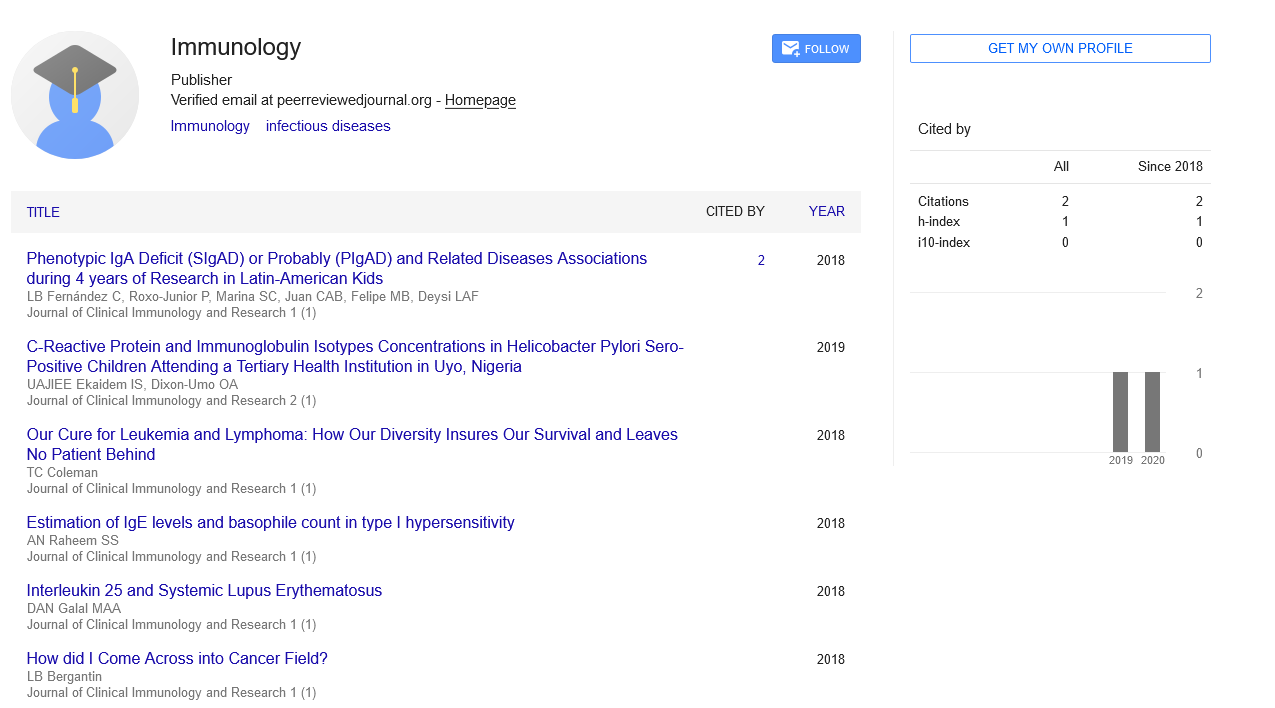Perspective, J Clin Immunol Res Vol: 6 Issue: 1
Immune Modulation Effects of Microbial Products
Subramanyan Kumar*
1Department of Metabolic Cell Signalling Research, University of Nuclear Medicine and Allied Sciences, Lucknow Road, New Delhi, India
*Corresponding Author: Subramanyan Kumar
Department of Metabolic Cell
Signalling Research, University of Nuclear Medicine and Allied Sciences, Lucknow
Road, New Delhi, India
E-mail: kumarsubram@unmas.edu.in
Received date: 19 March, 2023, Manuscript No. JCIR-23-99615;
Editor assigned date: 22 March, 2023, PreQC No. JCIR-23-99615 (PQ);
Reviewed date: 05 April, 2023, QC No. JCIR-23-99615;
Revised date: 12 April, 2023, Manuscript No. JCIR-23-99615 (R);
Published date: 19 April, 2023, DOI: 10.4172/JCIR.100068
Citation: Kumar S (2023) Immune Modulation Effects of Microbial Products. J Clin Immunol Res 6:1.
Description
Microorganisms play a pivotal role in shaping the host immune response through the production of various microbial products. These products, generated by bacteria, viruses, fungi, and parasites, can interact with the host immune system and modulate its activity. The study of these interactions, known as microbial immunology, has shed light on the complex mechanisms by which microorganisms can either stimulate or suppress immune responses.
Immune modulation effects
One of the key mechanisms by which microbial products modulate the immune response is through the activation of Toll-Like Receptors (TLRs). TLRs are a family of Pattern Recognition Receptors (PRRs) expressed on immune cells that recognize specific molecular patterns associated with microorganisms. Microbial products, such as Lipopolysaccharide (LPS) from Gram-negative bacteria, can bind to TLRs and trigger downstream signaling pathways, leading to the activation of immune cells and the production of pro-inflammatory cytokines. This immune activation is important for the clearance of pathogens and the initiation of an appropriate immune response.
Microbial products can also influence immune responses by inducing the production of cytokines. Cytokines are signaling molecules secreted by immune cells that regulate various aspects of the immune system. For example, LPS can stimulate immune cells to produce pro-inflammatory cytokines, such as Interleukin-1β (IL-1β), Tumor Necrosis Factor-alpha (TNF-α), and Interleukin-6 (IL-6). These cytokines plays a vital role in promoting inflammation and activating immune cells to combat microbial infections. On the other hand, certain microbial products can induce the production of antiinflammatory cytokines, such as Interleukin-10 (IL-10), which dampen immune responses and contribute to immune tolerance.
Antigen presentation is a vital process in the immune response, where immune cells present antigens to other immune cells, initiating an immune reaction. Microbial products can modulate antigen presentation and influence the immune response. For instance, bacterial cell wall components, such as peptidoglycan, can activate immune cells and enhance antigen presentation, leading to the activation of T cells and the initiation of an adaptive immune response. This modulation of antigen presentation is difficult for effective immune surveillance and the development of robust immune responses against pathogens.
Regulatory T cells (Tregs) are a specialized subset of immune cells that play a key role in immune regulation and tolerance. Microbial products can induce the generation and activation of Tregs, leading to immune suppression. This immune suppression is important for maintaining immune homeostasis, preventing excessive immune responses, and limiting tissue damage. Microbial products, such as certain bacterial metabolites and components, can promote the expansion and activation of Tregs, contributing to immune tolerance and protecting against autoimmune diseases.
Conclusion
Microbial products have a profound impact on the modulation of the host immune response. Through interactions with the immune system, microbial products can either stimulate immune activation or suppress immune responses, depending on the specific product and context. Understanding the immune modulation effects of microbial products is essential for elucidating the mechanisms of host-microbe interactions and developing innovative therapeutic strategies. Harnessing the immunomodulatory properties of microbial products may hold the key to designing targeted immunotherapies, combating infectious diseases, and modulating immune responses in autoimmune and inflammatory conditions.
 Spanish
Spanish  Chinese
Chinese  Russian
Russian  German
German  French
French  Japanese
Japanese  Portuguese
Portuguese  Hindi
Hindi 